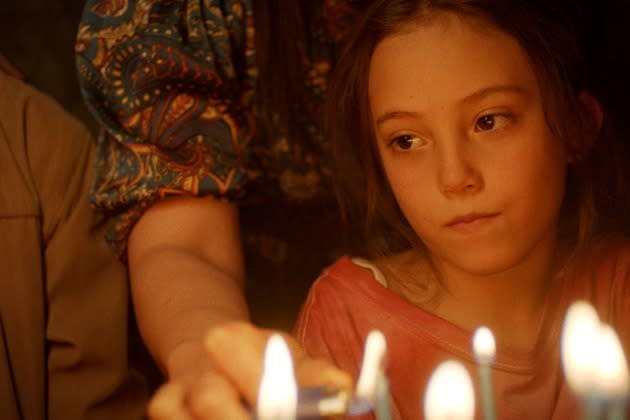‘Totem’ Review: A Mexican Family Portrait, Bursting With Beauty and Drama

Mexican writer-director Lila Aviles’ justly acclaimed 2018 debut The Chambermaid unfolded in a fancy Mexico City hotel whose rooms the titular heroine was always striving to clean, perpetually trying to erase the evidence of guests. Her follow-up, Totem, in the main competition at this year’s Berlinale, also unfurls mostly in one large space, but it’s a kind of looking-glass inversion of Chambermaid’s clinical austerity. This time, the environment is not an anonymous hostelry, but a well-loved, thoroughly lived-in family home teeming with relatives, clutter, pets, foodstuffs and memories that drift through the sunlight like dust motes.
Noisy, joyous and as exhausting as the multi-generational bash at the heart of its story, Totem packs a hefty wallop for a film that’s only 95 minutes, and should further solidify Aviles’ reputation as an auteur with a unique vision and remarkable skills with actors, especially non-professionals.
More from The Hollywood Reporter
'Boom! Boom! The World vs. Boris Becker' Review: Alex Gibney's Tennis Doc Is for Fans Only
'The Plough' Review: Director Philippe Garrel's Very French Family Affair
True to her name, eight- or nine-year-old Sol (discovery Naima Senties) is the still, shining warmth at the center of the story. She’s first seen with her mother Lucia (Iazua Larios), unsuccessfully trying to poop in one of several bathrooms that feature throughout. That Sol sits on her throne of porcelain giggling away as she chats to her mom is indicative of how open this family is with each other, to a degree that may be a bit alarming for more uptight viewers.
Indeed, the general lack of boundaries within this family may be one reason people like to take refuge in bathrooms throughout. Also, as if to underscore the fundamental animality of the people we meet — no different than birds, insects, cats or the many animals seen throughout the film — Aviles keeps reminding us of the characters’ basic human needs (to eat, to defecate, to vomit when ill) and how primary it is to have a place where those needs can be met and managed among loved ones. Viewers who are parents or have had to look after sickly relatives may respond especially viscerally to this.
Gradually, the narrative iris expands as we meet the many other members of Sol’s family as they prepare throughout the day for a birthday party scheduled that evening for Sol’s father, Tonatiuh (Mateo Garcia Elizondo), a painter. Mind you, it’s not exactly certain that he’ll even be able to attend. So thin he’s practically a bundle of sticks after a protracted and unfinished fight with cancer, Tonatiuh spends most of his time in bed at the family home, cared for by his loving hired nurse Cruz (Teresita Sanchez, co-star of The Chambermaid), too frail to even see Sol.
Downstairs, Sol’s aunts/Tonatiuh’s sisters bustle about preparing for the huge party. Bossy eldest Alejandra (Marisol Gase) multitasks by overseeing the food preparation and dyeing her hair. Nuri (Montserrat Maranon), whose own daughter Ester (Saori Gurza) is a little younger than Sol, tries to make a cake with her little girl, but as the day goes on she becomes less capable and increasingly sozzled by booze. Her own sons drift in and out of the house, ill-disposed like all teenagers to get off the sofa and do their chores.
Elsewhere, the family’s grumpy patriarch, Roberto (Alberto Amador), does his own thing, happy to leave all the preparations to the women. Mostly he comes out of his lair like a gruff bear to rail against his grandchildren when they have the temerity to steal his electrolarynx (the battery-operated machine that restores a voice when held against the neck for those who have had their larynx removed).
Although Sol, with her watchful, intelligent face (Senties gives a wonderfully naturalistic performance) is the lodestar of the film, the camera’s attention strays around the house to watch everyone getting on with the preparations. When the sun sets and all the guests arrive, the party starts in earnest, with emotional speeches and tables groaning with food in the garden outside, all lit by festoons of Christmas lights hung from the trees.
The dialogue in this back half in particular feels especially improvised, generated by the many non-professionals roped in to play versions of themselves or people they know. But there is a meticulous craft to the way Aviles and editor Omar Guzman splice everything together. Themes and structure emerge from what seems at first like chaos: the relationship between humans and the animal world, cosmology, the end of the world (which Sol asks a phone’s digital assistant about). Micro- and macrocosm expand and retract into one another throughout.
Perhaps because of that teeming sense of vastness and the density of the relationships explored, the film feels longer than it is, but not in any kind of unpleasant way. Like some of the large ensemble dramas of the Romanian New Wave, Totem packs in a massive amount of drama into a small space, and the rewards are immense.

